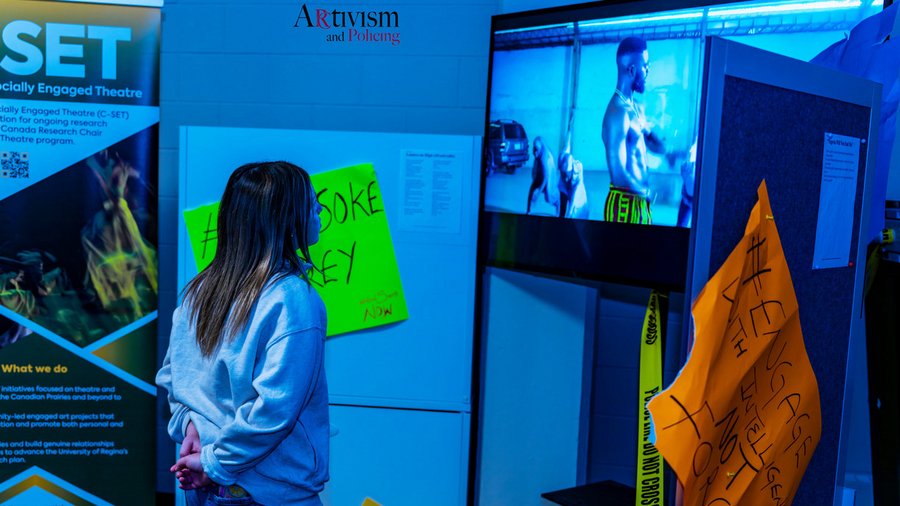Salzburg Global Fellow Taiwo Afolabi underscores storytelling’s empathy potential to spark social action, networks, and alliances for a sustained cultural and creative industry future
Taiwo Afolabi participated in Salzburg Global's Culture, Arts and Society session on "Creating Futures: Art of Narrative" from April 6 to 11, 2025.
“All lizards lie flat on their belly; we are not sure which one has a stomach ache.”
With the Yoruba proverb above, my mother always reminded me while growing up not to be too quick to judge because I am not in the other person's shoes. “Let right empathy move you to act on behalf of others,” she would say.
Empathy may not solve the world’s problems, but it can provide insight into others' experiences and create opportunities for imagining differently. Understanding, sharing, and caring about others' emotions and realities is critical in social relations. The right empathy can foster a mindset and support an atmosphere necessary for challenging discourses, establishing multiple centers from the margins to promote a robust and nuanced understanding essential for a better future.
As a Black interdisciplinary artist-researcher from Africa with internationally recognized expertise in social theater and creative industries focusing on social justice, human rights, and anti-racism education among Indigenous, immigrant, and marginalized communities, my scholarship and praxis challenge the status quo and invite us to collectively envision an equitable future.
Over the years, through my various engagements in over a dozen countries across five continents with organizations such as Theatre Emissary International and now at the Centre for Socially Engaged Theatre, I have come to believe that envisioning the not-yet and/or experiencing the unfamiliar without judgment requires listening and imagining ourselves in others' shoes. According to experts, empathy matters because it brings differential values to human connections. Indeed, empathy plays a critical role in shared intention and vision because it takes profound humility to let go, learn, and be okay with failure.
In our current civilization, with its anthropocentric twists and turns, we need more opportunities to experience the realities of others. Art, as an affect-driven and interactive tool in educational, social, and therapeutic contexts, can provide opportunities for such experiences. Beyond its healing power, it promotes shared understanding and community engagement while creating spaces for courageous dialogue on pressing issues such as fascism and policing. Art employs its empathetic superpower to raise awareness, disseminate knowledge in a relatable way, and galvanize communities of engaged citizens, policymakers, organizations, and institutions.
How might empathy inspire us to build networks and alliances to support artists’ individual and collective efforts? Harnessing the power of storytelling requires collective imagining. Through those networks, we can amplify ideas, strengthen each other’s hands, disrupt existing divisive systems and build more sustainable systems across place and time. We can craft new narratives for tomorrow as we question today, because the quality of the questions we ask today would determine the quality of the response we can elicit in building the future. We can sustain our stories and build structures that can sustain them as we share stories across borders.
As artists, learn your context and that of others. Ask what you can learn and what you can give. Think and work towards supporting other artists because this will help you scale your impact.
As I reflect on my mother’s teachings and live them in my life and through my praxis, here’s my hope: that emotions might move us to social action… that right empathy might challenge and enhance our critical thinking capacity and that we can beckon to a future characterized by equity.
Taiwo Afolabi is an assistant professor, the Canada research chair in Socially Engaged Theatre, and the director of the Centre for Socially Engaged Theatre (C-SET) at the University of Regina. He is also an internationally recognized artist-researcher and entrepreneur with experience in over a dozen countries across five continents. His work focuses on creative industries and community-based, socially engaged creative practices for transformational change. Taiwo employs storytelling, digital ethnography, and applied theater to collaborate with communities on addressing social issues relevant to them. His research contributes to advancing knowledge in the arts and culture sector. His professional and academic interests include amplifying voices, promoting equitable governance models, and exploring strategies and systems for marginalized communities. Taiwo is a member of the Royal Society of Canada and a fellow of the Royal Society of Arts (RSA). He is also the founding executive director of Theatre Emissary International and its social enterprise, Mobile Research Lab.
This article is part of our Annual Spotlight: “Centering Africa." Across our sessions and events in 2025, Salzburg Global is highlighting the central role that the African continent will play in global development now and in the next decades. As demographic trends across much of the world project a future of older and less productive economies, the African continent stands out for its growing youth population, dynamism and innovation. In reimagining an international system that better responds to the needs of the 21st century, it is our hope that Salzburg Global can play a small but meaningful role in centering African ideas, innovations, and perspectives in global forums like ours.


